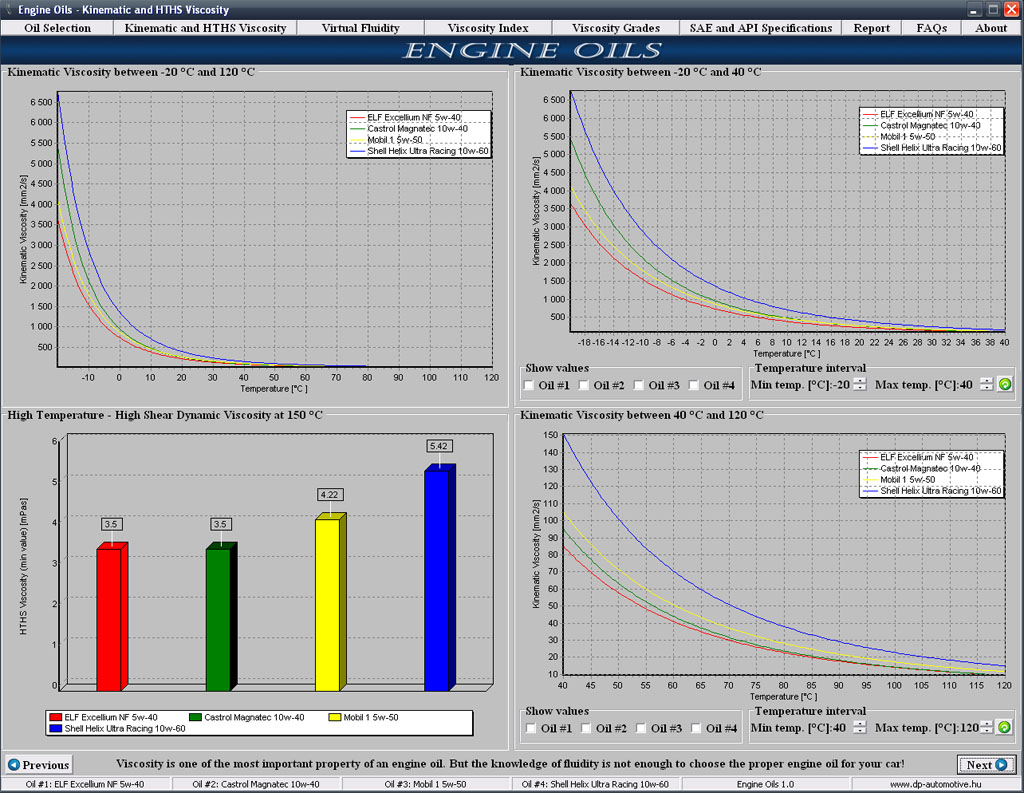There is only the OEM heat exchanger is in my car. But I use 82C deg temp thermostat, this setup with Mobil 1 5w50 is good for cruising and hill climb, the oil temp remains below 110 C deg at all time, if the ambient temp is above 25 C deg. But under 25 C, the engine cannot get warm up properly.
Results 11 to 16 of 16
Thread: Oil change
-
22-05-2012, 12:05 #11
-
22-05-2012, 12:37 #12Forum User

- Join Date
- Jul 2011
- Posts
- 605
OK so provided I have good oil pressure, no aftermarket oil cooler or thermo,
with 10w50 fully synth I should be able to run comfortably in high ambient temp locations, take a few laps around a track and at the same time be comfortable with cold starts.
-
22-05-2012, 15:40 #13Yes, but 5w50 would be better in winter.
 Originally Posted by fabulicious
Originally Posted by fabulicious
4 oils' kinematic and HTHS viscosity are compared directly in this chart, you can see the difference between different grade oils (higher the number of viscosity, the more viscous the oil):

-
22-05-2012, 16:26 #14Forum User

- Join Date
- Jul 2011
- Posts
- 605
Yanoo can you explain the "high shear dynamic viscosity chart" in laymans terms.
i think from the rest of them it shows that at a certain temp all the oils are going to do the same thing. no?
Then I heard some oil's can even get thicker as they warm up.Is this true?
-
22-05-2012, 20:20 #15
HTHS viscosity is a very important oil property, it has important implications for such factors as engine fuel economy, valvetrain wear and bearing protection. Higher the HTHS viscosity, the better the engine protection. However too high HTHS viscosity can restrict the engine's ability for revving up easily, especially if the higher HTHS is combined with higher oil grade (w50, w60). Therefore in a competition engine too high HTHS value is not favourable. Ester based (racing) engine oils (like Motul 300V series) have outstanding HTHS viscosity, while their kinematic viscosity may be low. For example the HTHS viscosity of Motul 300V Power 5w-40 (full synthetic, ester based racing oil) is 4.51 mPa*s, it exceeds the HTHS value of a quality 5w-50 full synth (not ester based, but PAO based) engine oil, and it's very close to a less quality 10w-60 grade oil's HTHS value. A minimum HTHS viscosity for a given oil grade is determined by the SAE J300 regulation. Unfortunately HTHS viscosity is not so frequently represented in the oils data sheet, therefore my software uses the allowable lowest HTHS value for the given oil grade, if it's unkown.
-
22-05-2012, 20:40 #16No it's not true, but viscosity improvers (oil additive) try get the oil thicker. The compounds of VI improvers are sphere shaped in cold, they can roll on one another easily. When the oil warms up, these spheres open, and they become rod shaped. These rods can restrict the movement of other compunds / molecules, thus the kinematic viscosity of the oil won't be so low as it would be without VI improvers.
 Originally Posted by fabulicious
Originally Posted by fabulicious
Similar Threads
-
how much oil on a change?
By Rajk in forum MechanicalReplies: 5Last Post: 04-04-2007, 21:48 -
Its all change....
By freebone16v in forum PicturesReplies: 5Last Post: 13-03-2007, 00:27 -
A Change.....
By dannyt in forum WilliamsClio DiscussionReplies: 13Last Post: 05-03-2007, 21:05 -
coolent change / therm stat change
By Mattie in forum MechanicalReplies: 4Last Post: 02-05-2006, 19:36






 Reply With Quote
Reply With Quote